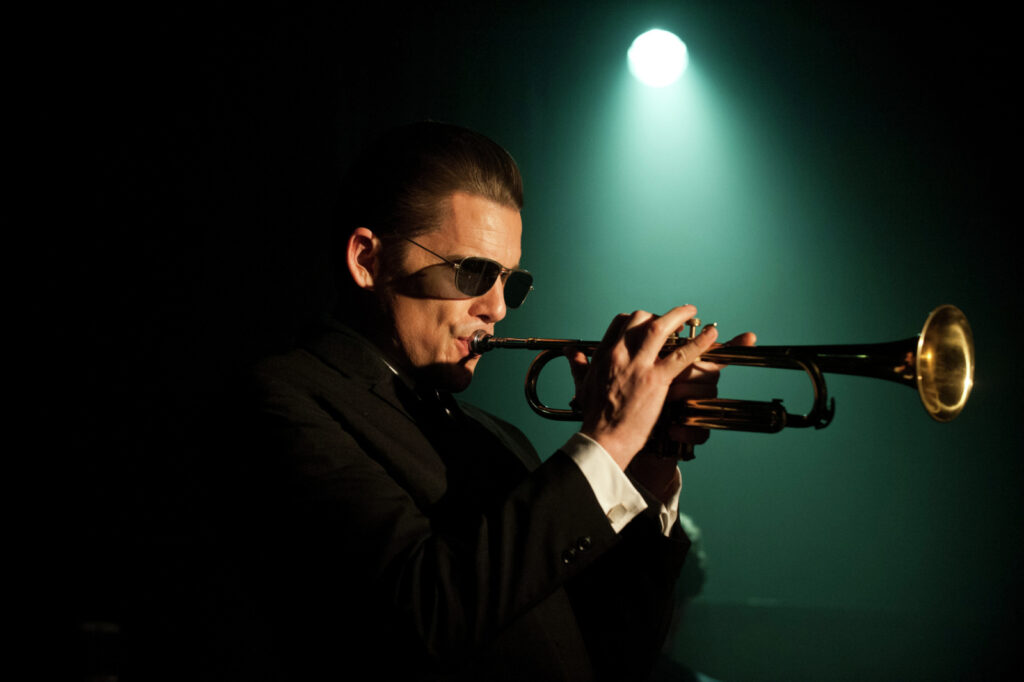Cinema will always be fascinated by flawed genius. As much
as biopics are designed to highlight the talents on display, they also serve to
make icons relatable. They have demons just like you and me; especially if they’re
musicians. If Hollywood has taught us anything, it’s that great musical talent
often comes with great personal problems. It certainly did for Chet Baker, the
subject of Robert Budreau’s very good “Born
to Be Blue,” a film anchored by one of Ethan Hawke’s best performances. The
film succumbs to the inherent “then this happened” nature of the music biopic,
but Hawke grounds it in such a convincing way (ably assisted by Carmen Ejogo
and Callum Keith Rennie) that it’s easy to forgive its clichés. And Budreau
clearly knows and loves his subject matter, having created a short film about
Baker before expanding to feature length. He also notably pushes up against the
standard structure of the biopic whenever possible.
Chet Baker had a roller coaster of a career, the peaks fueled
by his heartfelt ability to play the trumpet and the valleys deepened by his
addiction to heroin. “Born to Be Blue” wisely doesn’t try to arc the entire
career of Baker, starting years after he began his battle with drugs, but
before his comeback in the ‘70s. And Budreau makes his intent to focus on Baker’s
talent as much as his addictions clear by starting with a lengthy solo from the
artist. Five minutes in, bathed in black-and-white photography, Baker is
trying drugs for the first time with a clichéd line like “I never tried it before.” Cut. It’s a movie within a movie about
Baker. Budreau is putting the clichés on the table. Making it clear that he
knows that this is the old-fashioned way to shoot a biopic, and he’s going to
try and subvert it.
It’s the end of the ‘60s, and Baker falls hard for the
actress playing an amalgamation of women from his life in the film within a
film, a gorgeous woman named Jane (Carmen Ejogo). As the two fall for each
other, tragedy strikes when Baker is mercilessly beaten after a gig in what some
say was a drug vendetta for payments unmade. Baker’s teeth were shattered,
making his career as a musician questionable and causing him a degree of pain
for the rest of his life. Jane stays by his side though, even as addiction
returns and the colleagues and his producer (Callum Keith Rennie) give up on
him.
Hawke embodies Baker with a high whisper of a voice, missing
teeth and a quirky cadence. It’s a riveting performance from first scene to last. He seems uncomfortable in his own skin, but more
out of insecurity than anything else. We don’t usually see Hawke play characters
this vulnerable and scared. His take on Baker is a man always seeking approval,
and only comfortable when he’s high. He asks people “Is everything OK?” a lot. And he tells Jane something that I think
served as the foundation of his demons: “You
should find one thing and be better at it than anybody else in the whole world.”
That kind of all-or-nothing thinking leads to damage, especially for someone as
insecure as Baker, thrusting him into addiction when he falls short of his own
impossible standards.
There are times when I wish “Born to Be Blue” was a bit more
ambitiously structured, but Budreau tries. It’s almost dreamlike in moments. But it
doesn’t quite commit to being as different from the pack as its subject matter
was to jazz. Surprisingly, and successfully, it becomes a love story. Hawke and
Ejogo have phenomenal chemistry, as she plays Jane more as a stabilizer than a
savior. There’s a tender scene in the third act in their trailer that’s just a
beauty. This is a movie about a junkie who often succumbed to his addictions,
but it’s not a dark descent into hell. It takes a lot of time for hope, joy,
music and love. It’s about a fear of failure, a need to express, and a desire
to be great. Who can’t relate to that? We all have a little bit of that in us,
and whether it drives us to greatness or tragedy, only time will tell.












